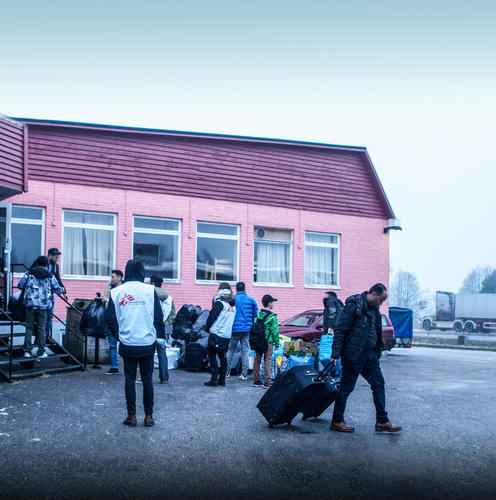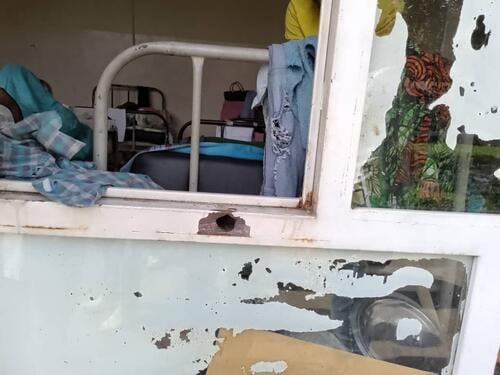- A new report by Médecins Sans Frontières (MSF) reveals that many asylum seekers suffer from mental health problems and that their uncertain life situation in destination countries is the main contributing factor.
- The report, which is based on a project in Sweden, also highlights obstacles that prevent asylum seekers from receiving the care they need and have a right to.
- MSF calls for improved access to mental health care services for asylum seekers.
The report “Life in limbo” is based on MSF’s mental health project for asylum seekers in Sweden. The organisation has extensive experience of providing psychosocial support to refugees and migrants worldwide, including several European destination countries such as Belgium, France, Germany, Greece, Italy and Serbia. This however was the first time a similar project was undertaken in Sweden.
The project, which ran from August 2016 to August 2017, followed an assessment of the needs among asylum seekers in Sweden. Throughout the project, MSF offered psychosocial support to 550 asylum seekers in Skaraborg county in southwest Sweden. Most of them came from countries affected by war, such as Afghanistan, Syria and Iraq. MSF’s innovative and culturally sensitive support model for asylum seekers prioritises early intervention and includes mental health screenings, counselling sessions and psychosocial activities.
Fear of the future leads to worry and stress
Throughout the project, MSF screened 219 asylum seekers for symptoms of mental health distress. Over half of those screened were offered an in-depth assessment and counselling sessions. During this process, asylum seekers most commonly showed symptoms related to anxiety, depression and post-traumatic stress.
The main factor that affects asylum seekers’mental health, is their uncertain and powerless situation in the destination country. In depth-assessments revealed frequent struggles with the following life experiences:
- Fear of the future (29%)
- Delays in the asylum process (25%)
- Fear of deportation (23%)
Traumatic experiences prior to and during the journey to Sweden were also shown to have left their mark on asylum seekers’ mental health. Many of those assessed reported being subjected to some form of violence – in some cases even torture – or having a family member disappear or be killed.
“Uncertainty about the future is the main reason why asylum seekers are feeling depressed and out of hope. It’s tragic and worrying that their situation in Sweden actually makes them feel worse,” says Jenny Gustafsson, coordinator of the MSF project in Sweden.
Asylum seekers are denied care
Besides their vulnerability in having to go through a demanding asylum process, individuals claiming asylum face several obstacles that limit their access to mental health care. In some cases, MSF found that asylum seekers were initially denied care on the grounds that they were still in the asylum process, even to services they are legally entitled to. Only upon insistence by MSF staff were they finally granted access to health care. At some health care centres, managers bluntly stated they did not offer mental health care to asylum seekers.
Only 26 percent of those screened by MSF confirmed being asked about their mental health during the health screening offered to them upon arrival in Sweden. This may be one of the reasons why mental health problems is not detected early enough amongst asylum seekers. Many asylum seekers also lack information about their legal rights and where to turn to for help. Stigma and communication difficulties further prevent them from getting access to the right care.
“We need targeted interventions to improve access to mental health care services for asylum seekers. Our experience shows that relatively simple measures can bring about a positive change to their well-being. That’s why it’s important for asylum seekers to be offered psychosocial support at an early stage, to prevent and relieve symptoms of mental health distress. We believe the model of intervention we applied in Sweden can serve as guidance and inspiration for other actors,” summarises Jenny Gustafsson.
Throughout the project, MSF worked at four asylum centres for adults and nine homes for unaccompanied minors in Skaraborg county, Sweden. Psychosocial support consisted of mental health screenings, individual counselling sessions, psychoeducation, general health information, assistance with referrals to specialist care and social activities. Individuals with symptoms of severe mental health issues as well as those with physical problems were referred to primary- and specialist care. Besides this project, MSF has only had operational presence in Sweden once before, between 2004 and 2005, when the organisation guided undocumented migrants to healthcare services in Stockholm. MSF is increasingly specialised in mental health care and in 2016 offered psychosocial support to 229,000 patients all over the world, including in many of the countries those seeking asylum in Sweden originally fled or passed through on their journey north through Europe.






